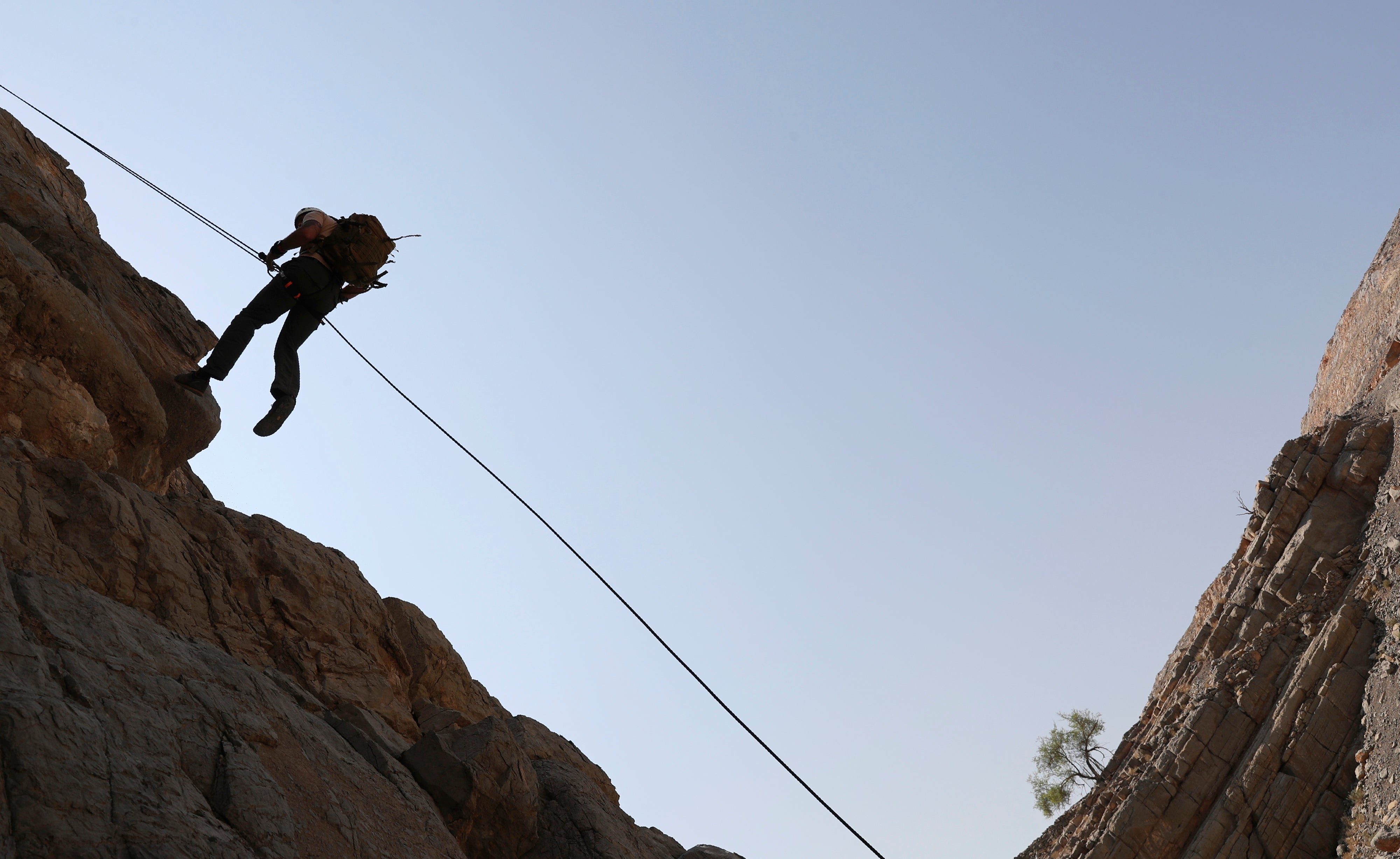UAE sheikhdom hopes Bear Grylls camp draws pandemic tourists
The northernmost sheikhdom in the United Arab Emirates hopes a brand new adventure camp showcasing its wide-open spaces, fresh air and socially distanced mountain peaks can aid in reviving its tourist industry amid the coronavirus pandemic

Your support helps us to tell the story
From reproductive rights to climate change to Big Tech, The Independent is on the ground when the story is developing. Whether it's investigating the financials of Elon Musk's pro-Trump PAC or producing our latest documentary, 'The A Word', which shines a light on the American women fighting for reproductive rights, we know how important it is to parse out the facts from the messaging.
At such a critical moment in US history, we need reporters on the ground. Your donation allows us to keep sending journalists to speak to both sides of the story.
The Independent is trusted by Americans across the entire political spectrum. And unlike many other quality news outlets, we choose not to lock Americans out of our reporting and analysis with paywalls. We believe quality journalism should be available to everyone, paid for by those who can afford it.
Your support makes all the difference.The northern-most sheikhdom in the United Arab Emirates hopes a new adventure camp showcasing its wide-open spaces, fresh air and socially distanced mountain peaks can aid in reviving its tourist industry amid the coronavirus pandemic.
And if that doesn't work, there's the bug eating — a hallmark of the British adventurer whose name graces the course.
Ras al-Khaimah has partnered with survival instructor Bear Grylls to offer a new outdoor adventure camp on Jebel Jais, a mountain that has the highest point in the oil-rich UAE
The former Special Air Service trooper offers a can-do attitude in his televised treks into the unknown with a camera crew in tow. His outdoor witticisms pepper the course offered in Ras al-Khaimah, which can last for several hours or include a full overnight experience with courses in knifemanship, knot tying and eating far beyond the norms of room service on a beachside vacation.
“People want to be put out of their comfort zone now and that’s what we try to do," Martin Norton, the lead instructor of the Bear Grylls Survival Academy, told The Associated Press. "We try to take everyone to their sort of limit where they feel like they’re uncomfortable and we can, you know, push them. And people then believe after the course they’re capable of a lot more than what they think they are.”
On Thursday, participants on Jebel Jais rappelled down the sheer face of a mountainside, a herd of goats bleating above them. Several grimaced through the dried worms, which tasted to one AP journalist like bulgur wheat until an instructor helpfully noted they leave a long-lingering aftertaste.
Already, Grylls' adventure camps have sprung up in his native United Kingdom, as well as 10 locations in China. The Ras al-Khaimah camp marks his first in the Middle East, on a mountain also home to a palace of the emirate's hereditary ruler, Sheikh Saud bin Saqr Al Qasimi.
It's OK if you need to check a map to find Ras al-Khaimah — or “Top of the Tent” in Arabic. The emirate often finds itself overshadowed by skyscraper-studded Dubai or oil-rich Abu Dhabi, the powerhouse emirates in this federation of seven sheikhdoms.
The emirate, otherwise known for a ceramics factory bearing its initials RAK, has worked to increase tourism, offering itself as a secondary destination in the UAE or a quick holiday for the country's millions of expatriate workers. Russia, Kazakhstan and other nations once part of the former Soviet Union represent most of the tourists coming from abroad.
Ras al-Khaimah had reported reaching 1.12 million visitors in 2019.
But then came the coronavirus pandemic, which saw worldwide aviation halted and robbed the entire UAE of its crucial tourism market. The sheikhdom sought out the “staycation” market, only to find itself the target of British tabloids in May over one hotel's packed pools and cheek-to-jowl lines for the bar during the holy Muslim fasting month of Ramadan.
The fresh air, the space while clambering over rocks in a wadi, or valley, and the austere style of the Bear Grylls camp appears for now to offer the opposite of that. There are plans to build overnight sleeping cabins out of shipping containers for guests. A model cabin stood open Thursday, with plywood-styled bunk beds and a small electrical generator chugging away near the rising mountainside.
Alison Grinnell, the CEO of RAK Hospitality Holding, a state-owned hotel operator, told the AP that travelers want “escapes” like those offered by the new adventure camp.
“We’re never going to go back 100% to how we were," Grinnell said of how the pandemic changed tourism. “I think people have got used to more space.”
Ras al-Khaimah now offers free coronavirus nasal-swab tests for international travelers as well, said Raki Phillips, CEO of the Ras al-Khaimah Tourism Development Authority.
“It’s something that’s subsidized by the Ras al-Khaimah government to ensure that we welcome tourists, they know they’re safe and we can take care of that burden on them,” Phillips said.
He added: “There is no easier way to social distance than to be on a mountain.”
___
Follow Jon Gambrell on Twitter at www.twitter.com/jongambrellAP.